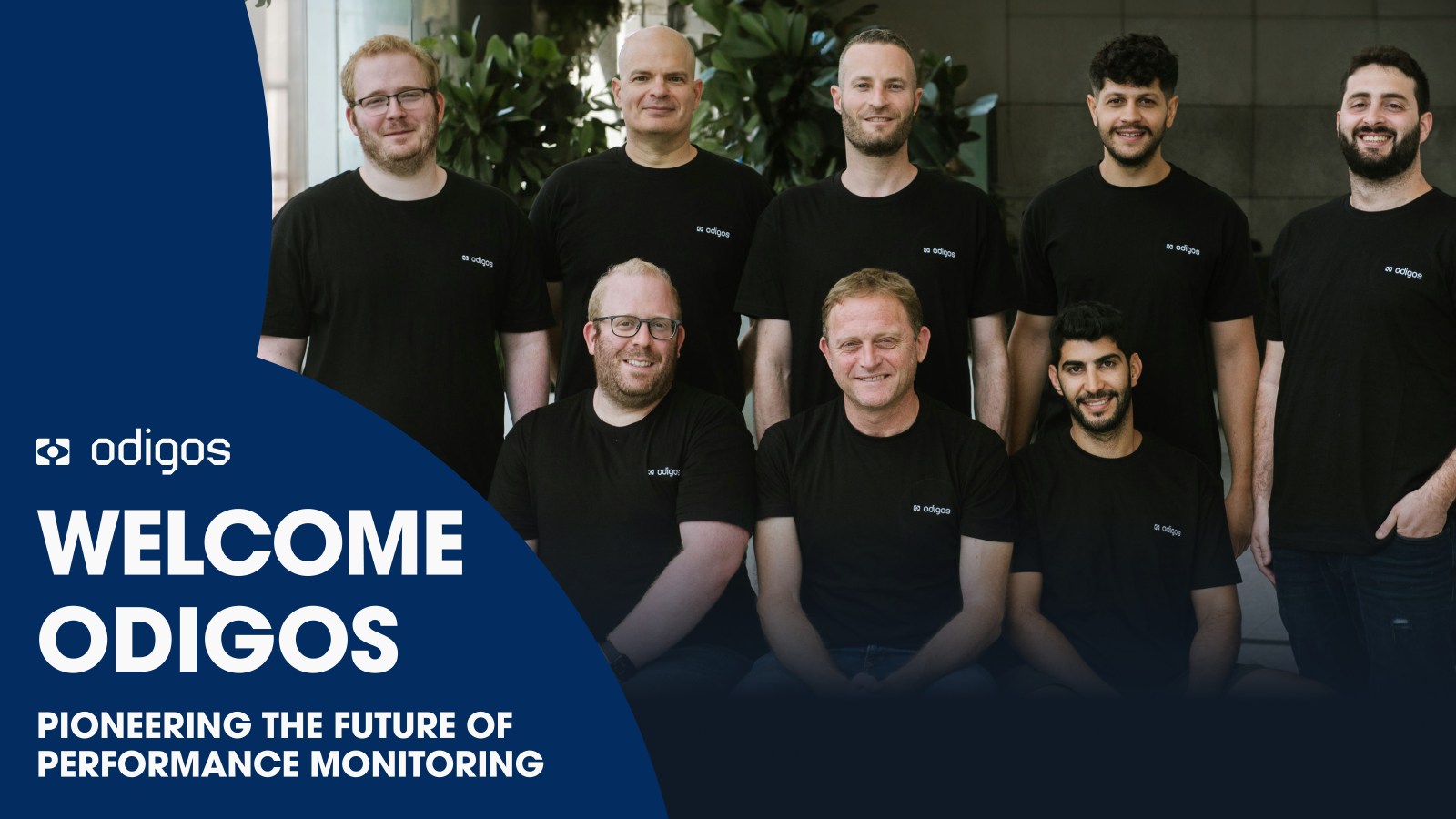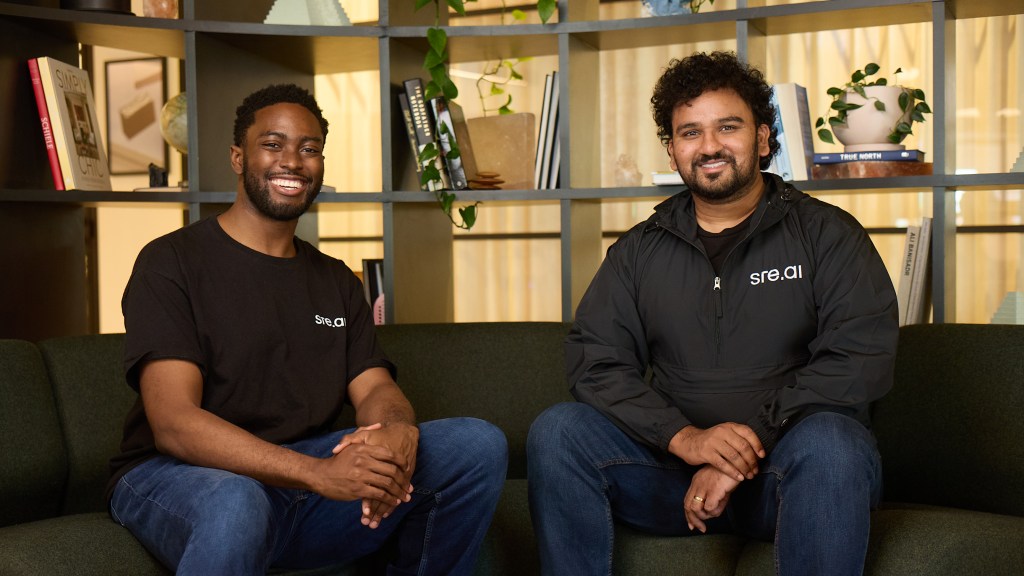Welcome, Odigos!
Pioneering the future of performance monitoring.
- Founder: Eden Federman, Ari Recht
- Sector: Infrastructure
- Location: Tel Aviv, Israel
The Opportunity
In today’s world, software performance *is* the business – if your software’s not running, you’re not in business. As such, observability – the monitoring and troubleshooting of software performance – is a mission-critical component of every enterprise’s technology stack. Enterprises today spend 20-30% of their IT budgets on observability, but they’re being poorly served by these dollars in three critical ways.
First, enterprises have trouble getting rich tracing data on all their applications for complete observability. Traces provide an end-to-end view of the flow of requests as they traverse components of a system. They sit alongside logs and metrics as a key pillar of monitoring. As software has shifted to a cloud-native architecture, traces have become the most important telemetry type (debugging based on logs and metrics alone does not scale well over multiple microservices, leading to longer times to resolve incidents).
But traces are very hard to collect because they require manual changes to the code to instrument it to emit telemetry. Code changes are a burden on engineering teams and risk introducing errors. Automatic instrumentation, which should relieve developers of manual changes, slows down application performance, cannot be applied to all code languages, and does not always collect the deepest insights. As a result, teams are missing this critical end-to-end view.
Second, enterprises are overwhelmed by volumes of noisy data that make it difficult to discover meaningful signals. This data surge is partially driven by an attempt to compensate for lack of traces with more and more logs. In a study by Chronosphere, 69% of observability professionals reported that data is growing at a “concerning rate” and in order to reduce it, they’re often limiting the applications observed or the monitored metrics. Meanwhile, data growth is not getting us closer to true observability — in a survey by Elastic, only 10% of professionals report being able to identify the root cause of an issue. The upshot is enterprises are missing key data and drowning in it.
Third, enterprises face spiraling costs driven by escalating data volumes and vendor lock-in. Observability costs are regularly in the tens of millions because they’re driven by the amount of data collected, analyzed, and stored — which so far has only gone in one direction. Further, the underlying collection of telemetry data is done by proprietary vendor agents which are inserted into your code. The collected data is emitted in closed vendor formats, compatible only with their tools.
To fight back against these costly, closed systems, there is a transformational movement underway to converge on open standards like OpenTelemetry. However, this is not an easy shift. While 87% of respondents to the Elastic survey agree that OpenTelemetry will be the standard for observability data within the next 5 years, only 9% of teams have moved it to production thus far. OpenTelemetry instrumentation is difficult and requires hundreds of engineering hours to implement; expertise in the technology is rare. Incumbent monitoring vendors certainly have little incentive to help customers as the move to OpenTelemetry reduces their lock-in power. Enterprises are stuck.
The Solution
Odigos offers an observability solution that gets to the root of these data and cost issues. Odigos uses a powerful combination of eBPF technology and OpenTelemetry to instrument applications to emit rich traces data in OpenTelemetry format. By acting at the kernel level through eBPF, Odigos’ platform can collect traces with zero changes to the code and de minimus impact on app performance. Their technology also allows for instrumentation changes on the fly and deeper dives into traces to show request flows that had previously been black boxes to observability teams. Crucially, Odigos takes a modular approach, allowing customers to export their collected data to any monitoring backend they choose – freeing organizations from costly vendor lock-in. With Odigos, enterprises can instantly access the meaningful telemetry data they need in an OpenTelemetry format they can control.
Odigos began as an open-source project that rapidly gained popularity and its enterprise version is now used within Fortune 500 organizations across tens of thousands of microservices. Odigos’ customers are saving engineering hours that would have otherwise been spent on instrumentation. Customers are reaching convergence to the OpenTelemetry standards on their own terms (not tied to a single vendor ecosystem) and with dramatically less effort. As such, customers are getting the critical traces telemetry needed to monitor cloud-native applications.
Why We’re Backing Odigos
The Odigos team, vision, and technology excited us from our first meeting. Odigos stands out for their technical achievements, unique perspective on the industry, and personal integrity. CTO and co-founder Eden Federman is a lifelong observability expert who created and donated to CNCF the code that underlies OpenTelemetry’s auto-instrumentation for the Go language. Eden has assembled a stellar team of OpenTelemetry Maintainers and eBPF experts. Eden and co-founder and CEO Ari Recht graduated from Y Combinator in 2023 and since then have shipped fast and robust products with a small but scrappy team.
We believe Odigos is solving two of the most important challenges in the market — data and cost — while ultimately helping enterprises achieve cloud-native observability and transition to open standards. We love that they’re tackling the most difficult problems in the little-noticed, but critical “first mile” of observability. And they have a unique go-to-market wedge in helping enterprises transition to OpenTelemetry and free themselves from dependence on vendor-provided agents. From the get-go, they have worked with the world’s largest enterprises, showing their ability to deliver to the highest standards at scale.
What’s ahead?
We’re excited to partner with Odigos as they emerge from stealth and launch their enterprise product to the market. We believe their technology is key to unlocking true observability for the cloud-native era.
And we’re thrilled to be backing Odigos alongside Venture Guides, Mango Capital, Firestreak Ventures, and angels that are observability founders themselves, including Martin Mao (co-founder, Chronosphere), Christine Yen (co-founder, Honeycomb), Yuri Shkuro (creator of Jaeger), and Ben Seigelman (co-founder, Lightstep).
Welcome to Salesforce Ventures, Odigos!











